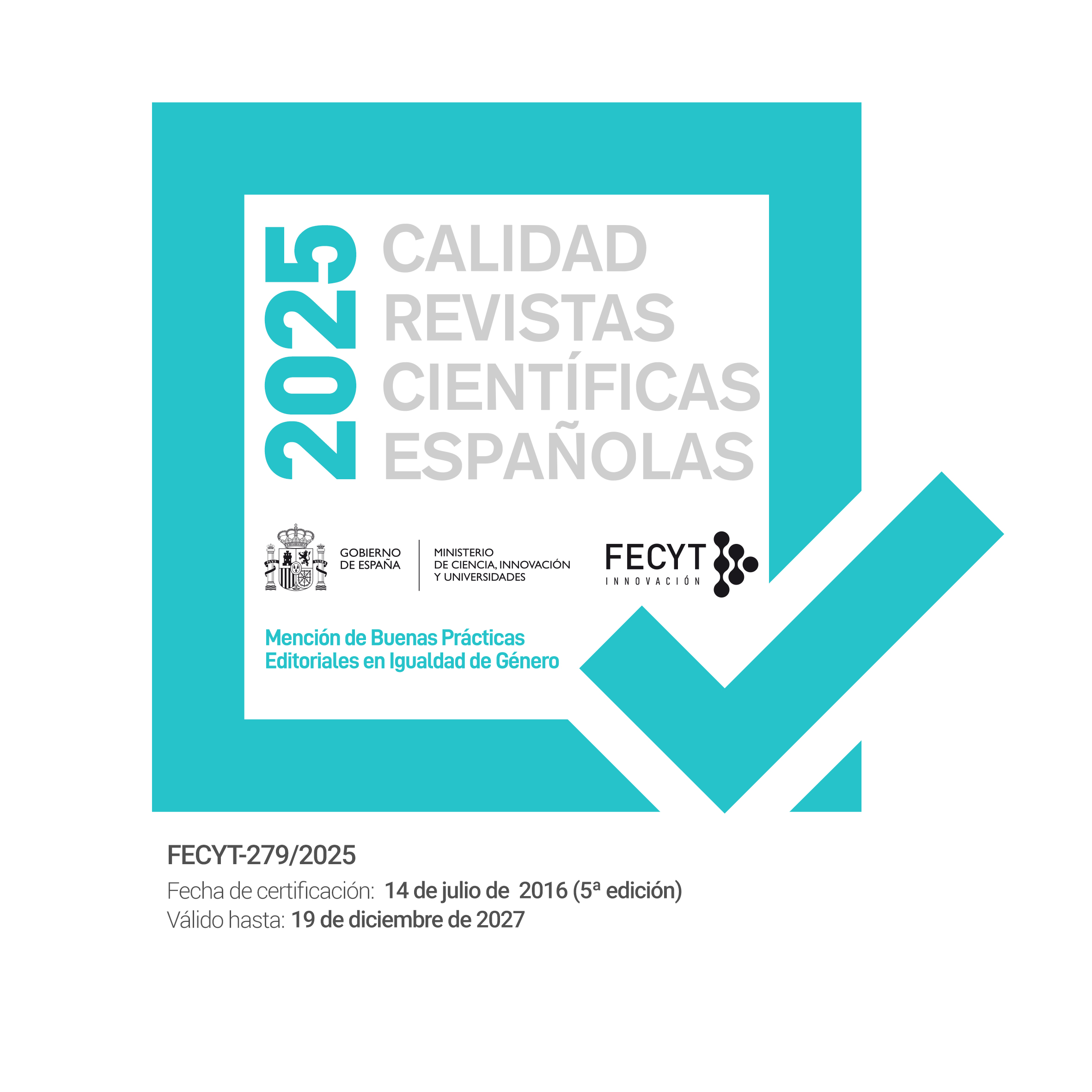The Morphological and Semantic Types of Old English Lost Adjectives
DOI:
https://doi.org/10.26754/ojs_misc/mj.20139227Keywords:
Old English, adjective, word-formation, semantics, historical linguisticsAbstract
The aim of this article is to provide a morphological and semantic analysis of the ca. 4,800 Old English adjectives that, having got lost throughout linguistic evolution, are not included in the Oxford English Dictionary. On the morphological side, the category and inflectional class of the base of derivation as well as the affixes and the type of derivational process are taken into account, while the semantic analysis yields a classification of these Old English adjectives based on categories proposed by the Historical Thesaurus of the Oxford English Dictionary. The conclusion reached in the morphological analysis is that affixation patterns surviving into Present-day English and more type-frequent affixation patterns show lower percentages of lexical loss than, respectively, less type-frequent and lost affixation patterns. The main conclusion of semantic analysis is that lexical losses of the adjectival class often comprise adjectives denoting abstract qualities.
Downloads
References
Lexicographical sources:
Bosworth, Joseph and Thomas N. Toller. (1898) 1973. An Anglo-Saxon Dictionary. Oxford: Oxford U.P.
Clarkhall, John. (1896) 1996. A Concise Anglo-Saxon Dictionary. Toronto: University of Toronto Press.
Kay, Christian, Jane Roberts, Michael Samuels, and Irené Wotherspoon. 2009. Historical Thesaurus of the Oxford English Dictionary. Oxford: Oxford U.P.
Nerthus: An Online Database of Old English.. Accessed May 25, 2010.
Roberts, Jane, Christian Kay and Lynne Grundy. 2000. A Thesaurus of Old English. Amsterdam: Rodopi.
Sweet, Henry. (1896) 1976. The Student’s Dictionary of Anglo-Saxon. Cambridge: Cambridge U.P.
The Oxford English Dictionary (2nd. edition on CD-ROM, 2009).
Bibliographical references:
Burnley, David. 1992. “Lexis and semantics”. In Blake, N. (ed.) The Cambridge History of the English Language. Volume II: 1066-1476. Cambridge: Cambridge U.P.: 409-499.
De la Cruz Cabanillas, Isabel. 2007. “Semantic Primes in Old English: a Preliminary Study of Descriptors”. SELIM (14): 37-58.
Dixon, Robert Malcom Ward. 2006. “Adjective Classes in Typological Perspective”. In Dixon, R.M.W. and A. Aikhenvald (eds.) Adjective Classes: A Cross-linguistic Typology. Oxford: Oxford U.P.: 1-48.
Givon, Thomas. 1993. English Grammar. A Function-Based Introduction. I. Amsterdam: John Benjamins Publishing Company.
Guarddon Anelo, Maria del Carmen. 2009a. “Un análisis de las propiedades combinatorias de los primitivos semánticos a través de las adposiciones complejas en inglés antiguo”. Revista Española de Lingüística (39/2): 93-122.
Guarddon Anelo, Maria del Carmen. 2009b. “The Natural Semantic Metalanguage of Old English Compound Adpositions”. English Studies (30): 61-83.
Haselow, Alexander. 2011. Typological Changes in the Lexicon. Analytic Tendencies in English Noun Formation. Berlin: Mouton de Gruyter.
Hinderling, Robert. 1967. Studien zu den starken Verbalabstrakten des Germanischen.Berlin: Walter de Gruyter.
Kastovsky, Dieter. 1986. “Deverbal Nouns in Old and Modern English: from Stem-Formation to Word-Formation”. In Fisiak J. (ed.) Historical Semantics-Historical Word Formation. Berlin: Mouton de Gruyter: 221-261.
—. 1989. “Typological Changes in the History of English Morphology”. In Fries, U. and M. Heusser (eds.) Meaning and Beyond.Ernst Leisi zum 70. Geburstag. Tübingen: Gunter Narr Verlag: 281-293.
—. 1990. “The Typological Status of Old English Word Formation”. In Adamson, S., V. Law, N. Vincent and S. Wright (eds.) Papers from the 5th International Conference on English Historical Linguistics. Amsterdam: John Benjamins: 205-224.
—. 1992. “Semantics and Vocabulary”. In Hogg, R. (ed.) The Cambridge History of the English Language I: The Beginnings to 1066. Cambridge: Cambridge U.P.: 290-408.
—. 2005. “Conversion and/on Zero: Word-Formation Theory, Historical Linguistics, and Typology”. In Bauer, L. and S. Varela (eds.) Approaches to Conversion/Zero Derivation. Münster: Waxmann: 31-50.
—. 2006. “Typological Changes in Derivational Morphology”. In van Kemenade, A. and B. Los (eds.) The Handbook of The History of English. Oxford: Blackwell: 151-177.
Lass, Roger. 1994. Old English. A Historical Linguistic Companion. Cambridge: Cambridge U.P.
Martín Arista, Javier. 2011a. “Projections and Constructions in Functional Morphology. The Case of Old English HRĒOW”. Language and Linguistics (12/2): 393-425.
Martín Arista, Javier. 2011b. “Adjective Formation and Lexical Layers in Old English”. English Studies (92/3): 323-344.
—. 2012a. “Morfología flexiva en RRG”. In Mairal, R., L. Guerrero and C. González (eds.) El funcionalismo en la teoría lingüística. Madrid: Akal Universitaria: 43-58.
—. 2012b. “The Old English Prefix Ge-: A Panchronic Reappraisal”. Australian Journal of Linguistics (32/4): 411-433.
—. 2012c. “Lexical Database, Derivational Map and 3D Representation”. Revista Española de Lingüística Aplicada. (Extra 1): 119-144.
—. 2013. “Recursivity, Derivational Depth and the Search for Old English Lexical Primes”. Studia Neophilologica (85.1): 1-21.
—. Forthcoming. “Noun layers in Old English”.
—. and Francisco Cortés Rodríguez. Forthcoming. “From Directionals to Telics: Meaning Construction, Word-formation and Grammaticalization in Role and Reference Grammar”. In Gómez González, M. A., F. Ruiz de Mendoza Ibáñez and F. Gonzálvez García (eds.) Form and Function in Language: Functional, Cognitive and Applied Perspectives. Amsterdam: John Benjamins.
Martín Arista, Javier and Maria Victoria Martíndela Rosa. 2006. “Old English Semantic Primes: Substantives, Determiners and Quantifiers”. Atlantis (28.2): 9-28.
Mugglestone, Lynda. 2006. The Oxford History of English. Oxford: Oxford U.P.
Novo Urraca, Carmen. Forthcoming. “Old English deadjectival paradigms. Productivity and recursivity”.
Ogura, Michiko. 2002. Verbs of Motion in Medieval English. Cambridge: D. S. Brewer.
Strite, Vic. 1989. Old English Semantic-Field Studies. New York: Peter Lang.
Trask, Robert Lawrence. 1996. Historical Linguistics. London: Arnold.
Trips, Carola. 2009. Lexical Semantics and Diachronic Morphology. The development of -hood, -dom and -ship in the History of English. Tübingen: Max Niemeyer Verlag.
Wang, Elizabeth Grace. 2009. Gone but not Forgotten: Persistence and Revival in the History of English Word Loss. Master’s Thesis, University of Georgia.
Weman, Bertil. 1933. Old English Semantic Analysis and Theory with Special Reference to Verb Denoting Locomotion. Lund: University of Bokhandel.
Downloads
Published
Issue
Section
License
Copyright (c) 2014 Luisa Fidalgo Allo

This work is licensed under a Creative Commons Attribution-NonCommercial 4.0 International License.


